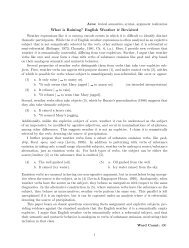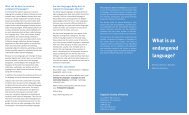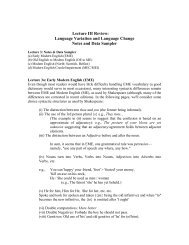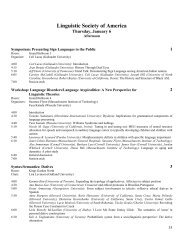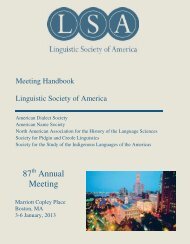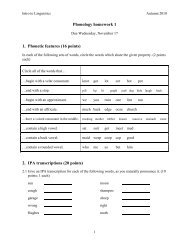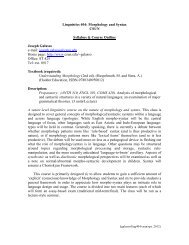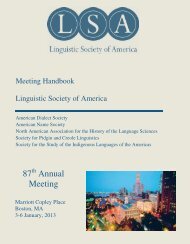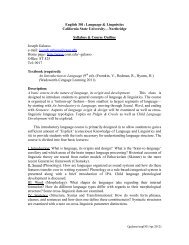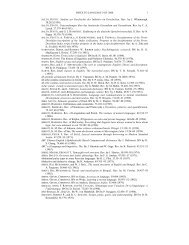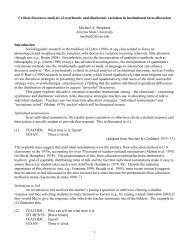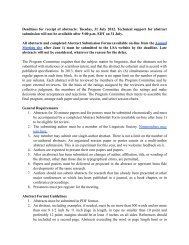View the meeting handbook - Linguistic Society of America
View the meeting handbook - Linguistic Society of America
View the meeting handbook - Linguistic Society of America
Create successful ePaper yourself
Turn your PDF publications into a flip-book with our unique Google optimized e-Paper software.
Claire Bowern (Rice University)Morphological change in Nyikina verbal prefix bundlesThe Nyikina language <strong>of</strong> North-Western Australia has preserved much <strong>of</strong> <strong>the</strong> material <strong>of</strong> Proto-Nyulnyulan verbal prefixes. However,while <strong>the</strong> same categories (person, tense, and transitivity) are marked in <strong>the</strong> prefix bundle, <strong>the</strong>re are differences in underlyingorganization. The intransitive prefixes continue <strong>the</strong> old past (intransitive) paradigm, while <strong>the</strong> transitive forms continue <strong>the</strong> oldpresent (transitive) paradigm. What seems to have happened is that a merger <strong>of</strong> present and past tense led to <strong>the</strong> association <strong>of</strong> <strong>the</strong> n-morpheme with <strong>the</strong> meaning 'intransitive', because it now stood in opposition to forms with <strong>the</strong> transitive marker n-, ra<strong>the</strong>r than inopposition to forms marked for present tense. Such a change does not necessarily bear on <strong>the</strong> question <strong>of</strong> whe<strong>the</strong>r paradigms were aseparate component <strong>of</strong> <strong>the</strong> grammar which produced <strong>the</strong> input to <strong>the</strong> change.Harold Koch (Australian National University)Paradigm-dependent processes <strong>of</strong> morphological changeI describe and illustrate from typologies <strong>of</strong> morphological change those changes that are most dependent on <strong>the</strong> concept <strong>of</strong> paradigmand hence provide <strong>the</strong> strongest support for paradigms as a term in linguistic <strong>the</strong>ory and <strong>the</strong> greatest obstacles for <strong>the</strong>ories that woulddispense with paradigms. A traditional type <strong>of</strong> change is paradigm leveling, in which alternation between stem forms is eliminatedfrom inflectional paradigms through <strong>the</strong> generalization <strong>of</strong> one <strong>of</strong> <strong>the</strong> variants. The domain <strong>of</strong> leveling depends heavily on paradigms.Of <strong>the</strong> many changes traditionally called ‘analogical’, those which introduce intraparadigm allomorphy or redistribute <strong>the</strong> allomorphs<strong>of</strong> lexical stems under <strong>the</strong> influence <strong>of</strong> <strong>the</strong> inflectional pattern <strong>of</strong> o<strong>the</strong>r lexemes (interparadigm analogy) would seem to stronglysupport <strong>the</strong> concept <strong>of</strong> paradigms. Similarly <strong>the</strong> forms <strong>of</strong> inflectional markers <strong>of</strong> one inflectional class are <strong>of</strong>ten transformed under <strong>the</strong>influence <strong>of</strong> o<strong>the</strong>r (especially dominant) inflectional classes.Adam Albright (Massachusetts Institute <strong>of</strong> Technology)Paradigmatic change without paradigmsAnalogical changes frequently involve switches between paradigm types, e.g. German gibe/gibst/gibt --> gebe/gibst/gibst, mirroring<strong>the</strong> pattern <strong>of</strong> trage/trägst/trägt. But does this prove that paradigms are cognitively represented as templates? If so, we should be ableto observe <strong>the</strong>ir role in motivating or constraining change. However, detailed examination <strong>of</strong> changes in progress reveals thatapparently paradigmatically motivated cases <strong>of</strong>ten defy paradigmatic explanation, e.g. German textual evidence shows an intermediatestage unlike any previous or surviving pattern: gebe/gibst/gebt. A similar change is currently creating new paradigm types in Korean.Such cases suggest that paradigmatic changes are not motivated by competition between templates.90



